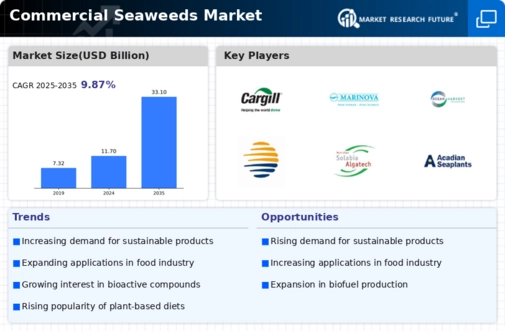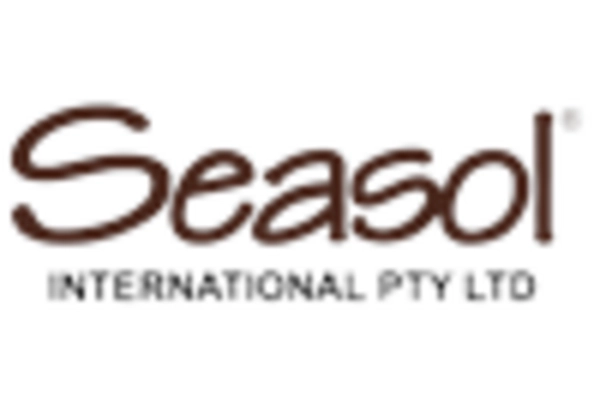Market Analysis
In-depth Analysis of Commercial Seaweeds Market Industry Landscape
The Commercial Seaweeds Market Size is influenced by a variety of market factors that contribute to its growth and expansion. One key driver is the increasing awareness of the nutritional and environmental benefits of seaweeds. As consumers become more health-conscious, there is a growing demand for natural and nutrient-rich food sources. Seaweeds, being rich in vitamins, minerals, and antioxidants, are gaining popularity as a superfood. This rising consumer interest in healthy eating habits directly impacts the commercial seaweeds market, driving its growth. The anticipated Commercial Seaweed Market Size is expected to reach USD 16.9 billion by 2028, with a Compound Annual Growth Rate (CAGR) of 10.10% from 2021 to 2028. The utilization of hydrocolloids such as carrageenan, alginate, and agar has expanded in the food sector, animal feed, medicines, and other industries in recent years. This trend has led to a rise in algal production and a notable increase in the demand for commercial seaweed.
Another significant factor shaping the Commercial Seaweeds Market is the expanding application of seaweeds across various industries. Seaweeds are not only valued for their nutritional content but also for their versatility in industries such as food and beverages, pharmaceuticals, cosmetics, and agriculture. The use of seaweeds as thickeners, stabilizers, and flavor enhancers in food products, as well as their incorporation into skincare and cosmetic formulations, is propelling the market forward. The diverse applications of seaweeds make them a valuable resource for multiple sectors, contributing to the overall market size.
The impact of climate change on traditional agriculture is also influencing the Commercial Seaweeds Market. Seaweeds are resilient and can be cultivated in marine environments unsuitable for traditional agriculture. As climate patterns shift, seaweed farming becomes an attractive and sustainable alternative for meeting global food and resource demands. The adaptability of seaweed cultivation to different marine ecosystems contributes to the market's growth as a climate-resilient solution for sustainable food production.
Furthermore, government initiatives and regulations are significant factors influencing the Commercial Seaweeds Market Size. Governments worldwide are recognizing the economic and environmental benefits of seaweed cultivation. Incentive programs, subsidies, and supportive policies are encouraging farmers and businesses to invest in seaweed farming. This favorable regulatory environment is fostering the expansion of the commercial seaweeds market by providing a conducive atmosphere for industry players to thrive.
Technological advancements and innovations in seaweed cultivation and processing methods contribute to the market's dynamics. Ongoing research and development efforts are focused on improving cultivation techniques, increasing yield, and developing new seaweed-based products. These innovations not only enhance the efficiency of seaweed farming but also open up new avenues for product development, creating opportunities for market growth.
The global economic landscape plays a crucial role in determining the Commercial Seaweeds Market Size. Economic considerations such as trade policies, market access, and consumer purchasing power influence the demand for seaweed-based products. Economic stability and growth contribute to increased consumer spending on premium and health-oriented products, positively impacting the commercial seaweeds market.
Market factors related to sustainability and environmental consciousness are gaining prominence. Consumers are increasingly seeking products with minimal environmental impact, and seaweeds align with this trend. Seaweeds are known for their low environmental footprint, as they require no arable land, freshwater, or fertilizers for cultivation. The market benefits from the growing preference for sustainable and eco-friendly choices among consumers, leading to increased adoption of seaweed-based products.
In conclusion, the Commercial Seaweeds Market Size is shaped by a combination of factors that reflect the evolving preferences of consumers, advancements in technology, environmental considerations, and supportive government policies. As seaweeds continue to gain recognition for their nutritional value and diverse applications, the market is poised for sustained growth. The multifaceted nature of these market factors positions commercial seaweeds as a promising and versatile resource in the global market landscape.


















Leave a Comment